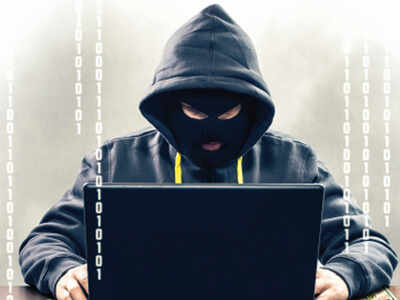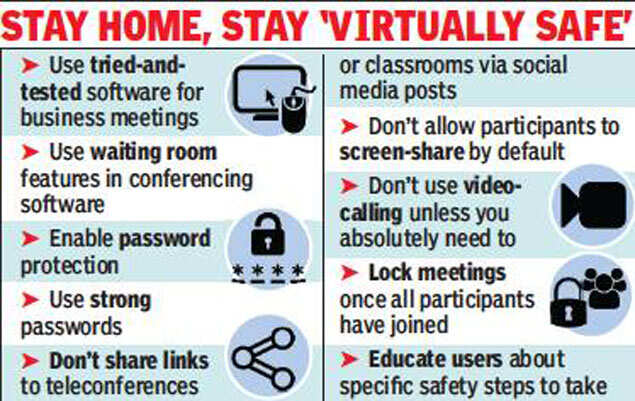
KOLKATA: At least two city-based professionals have fallen prey to ransomware attacks — demanding payment in Bitcoin to release captured data — in the past week while working from home, raising alarms about cyber safety, as an increasing number of Kolkatans settle into the new work-mode normal.
Both complaints received by Lalbazar have been from users of Zoom, the popular platform for hosting virtual meetings and conferences, about which experts have raised security concerns. Last week, the Union home ministry had issued an advisory against the platform; Google, too, recently banned employees from using Zoom over security concerns.

Both complainants told cops that hackers had encrypted sensitive information stored on their computers — files crucial to their businesses — and were demanding a ransom in Bitcoin to release the data. The victims had received emails with specific demands, along with links to purchase Bitcoin. The mails also contained a stern warning: non-compliance would lead to permanent loss of data.
One of the complainants told the cops that the hackers had demanded $1,000 in Bitcoin to decrypt his files.
The detective department’s cyber cell has taken up the probe, alongside the Special Task Force. “We have begun a probe to ascertain whether there’s a link between the app itself (Zoom) and the hackers,” said an investigator. Joint CP (crime) Murlidhar Sharma said a probe “covering all angles” had been launched.
An officer who’s part of the investigation said they suspected “organised crime syndicates” behind the attacks, who were cashing in on the lockdown, as more and more people were forced to work out of their homes. “They identify vulnerable computer systems and use ransomware to target sensitive files,”he said.
‘Data seized is enough to trap victims’
An officer said: “It does not seem the entire data can be hacked. But with the little data that has been compromised, it is enough to threaten the victim.”
Ransomware attacks have rarely been reported from Kolkata, although a leading Tollywood actor’s company had once been attacked sometime ago. Such attacks, though, are quite prevalent in several countries.
International media has been reporting — especially from Europe — how corporate experts were finding it increasingly difficult to protect data when it is dispersed on home computers with widely varying setups, and on company machines connecting remotely. Remote workers using virtual private networks (VPNs), which establish secure tunnels for digital traffic, are adding to the problem.
Sources said the probe team was investigating the role of some “old hands” involved in a similar operation in Kolkata sometime ago. “We are looking into some recent cases across the country, too,” said an officer.
Both complaints received by Lalbazar have been from users of Zoom, the popular platform for hosting virtual meetings and conferences, about which experts have raised security concerns. Last week, the Union home ministry had issued an advisory against the platform; Google, too, recently banned employees from using Zoom over security concerns.

Both complainants told cops that hackers had encrypted sensitive information stored on their computers — files crucial to their businesses — and were demanding a ransom in Bitcoin to release the data. The victims had received emails with specific demands, along with links to purchase Bitcoin. The mails also contained a stern warning: non-compliance would lead to permanent loss of data.
One of the complainants told the cops that the hackers had demanded $1,000 in Bitcoin to decrypt his files.
The detective department’s cyber cell has taken up the probe, alongside the Special Task Force. “We have begun a probe to ascertain whether there’s a link between the app itself (Zoom) and the hackers,” said an investigator. Joint CP (crime) Murlidhar Sharma said a probe “covering all angles” had been launched.
An officer who’s part of the investigation said they suspected “organised crime syndicates” behind the attacks, who were cashing in on the lockdown, as more and more people were forced to work out of their homes. “They identify vulnerable computer systems and use ransomware to target sensitive files,”he said.
‘Data seized is enough to trap victims’
An officer said: “It does not seem the entire data can be hacked. But with the little data that has been compromised, it is enough to threaten the victim.”
Ransomware attacks have rarely been reported from Kolkata, although a leading Tollywood actor’s company had once been attacked sometime ago. Such attacks, though, are quite prevalent in several countries.
International media has been reporting — especially from Europe — how corporate experts were finding it increasingly difficult to protect data when it is dispersed on home computers with widely varying setups, and on company machines connecting remotely. Remote workers using virtual private networks (VPNs), which establish secure tunnels for digital traffic, are adding to the problem.
Sources said the probe team was investigating the role of some “old hands” involved in a similar operation in Kolkata sometime ago. “We are looking into some recent cases across the country, too,” said an officer.

Coronavirus outbreak
Trending Topics
LATEST VIDEOS
City
 Watch: Clash breaks out between Punjab Police and shopkeepers for not following lockdown
Watch: Clash breaks out between Punjab Police and shopkeepers for not following lockdown  Chhattisgarh: Nisha Jindal, with 10,000 Facebook fans, turns out to be a man
Chhattisgarh: Nisha Jindal, with 10,000 Facebook fans, turns out to be a man  COVID-19: Cops attacked and held hostage in Madhya Pradesh's Rajgarh for enforcing social distancing
COVID-19: Cops attacked and held hostage in Madhya Pradesh's Rajgarh for enforcing social distancing  Will get back to my duty once I recover fully, says Punjab cop whose hand was chopped off
Will get back to my duty once I recover fully, says Punjab cop whose hand was chopped off
More from TOI
Navbharat Times
Featured Today in Travel
Get the app





